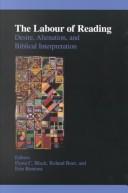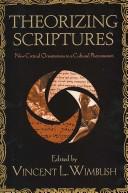| Listing 1 - 8 of 8 |
Sort by
|
Book
ISBN: 0823257363 0823257347 0823257371 0823261360 0823257355 0823257339 1322965196 Year: 2014 Publisher: New York : Fordham University Press,
Abstract | Keywords | Export | Availability | Bookmark
 Loading...
Loading...Choose an application
- Reference Manager
- EndNote
- RefWorks (Direct export to RefWorks)
Babylon is a surprisingly multivalent symbol in U.S. culture and politics. Political citations of Babylon range widely, from torture at Abu Ghraib to depictions of Hollywood glamour and decadence. In political discourse, Babylon appears in conservative ruminations on democratic law, liberal appeals to unity, Tea Party warnings about equality, and religious advocacy for family values. A composite biblical figure, Babylon is used to celebrate diversity and also to condemn it, to sell sexuality and to regulate it, to galvanize war and to worry about imperialism. Erin Runions explores the significance of these shifts and contradictions, arguing that together they reveal a theopolitics that tries to balance the drive for U.S. dominance with the countervailing ideals and subjectivities of economic globalization. Examining the confluence of cultural formations, biblical interpretations, and (bio)political philosophies, The Babylon Complex shows how theopolitical arguments for war, sexual regulation, and political control both assuage and contribute to anxieties about waning national sovereignty. Theoretically sophisticated and engaging, this remarkable book complicates our understanding of how the Bible affects U.S political ideals and subjectivities.
Globalization --- Sex in popular culture --- Violence in popular culture --- Sovereignty --- Sex --- War --- Christian sociology --- Church and state --- Christianity and state --- Separation of church and state --- State and church --- State, The --- Christian social theory --- Social theory, Christian --- Sociology, Christian --- Sociology --- Christianity and war --- Sex (Theology) --- Popular culture --- Religious aspects --- Christianity. --- History --- Babylon (Extinct city) --- In the Bible. --- Babel. --- Babylon. --- Theopolitics. --- biopolitics. --- detranscendentalize. --- globalization. --- queer theory. --- sexuality. --- torture. --- violence.
Book
ISBN: 9780823257379 Year: 2014 Publisher: New York, NY
Abstract | Keywords | Export | Availability | Bookmark
 Loading...
Loading...Choose an application
- Reference Manager
- EndNote
- RefWorks (Direct export to RefWorks)
Book
ISBN: 9781628371413 1628371412 9780884141679 0884141675 0884141667 9780884141662 Year: 2016 Volume: 84 Publisher: Atlanta SBL Press
Abstract | Keywords | Export | Availability | Bookmark
 Loading...
Loading...Choose an application
- Reference Manager
- EndNote
- RefWorks (Direct export to RefWorks)
This volume pursues critical readings of the Bible that put psychoanalysis into conversation with Marxist and postcolonial criticism of the Bible. Psychoanalysis is considered an important tool in understanding how the traumas of colonialism manifest both materially and psychically. Further, psychoanalysis provides a way to mediate between Marxism's materialist groundings and postcolonialism's resistance against empire. The essays in the volume illuminate the way empire has shaped the biblical text, by looking at the biblical texts' silences, ruptures, oversights, over-emphases, and inexplicable elements. These details are read as symptoms of a set of oppressive material relations that shaped and continue to haunt the text in the ascendancy of the text in the name of "the West.
Bible --- Marxist criticism. --- Psychology. --- Criticism, interpretation, etc. --- Postcolonial criticism. --- Psychology --- 22.06*4 --- 22.06*4 Bijbel: kritische exegese; conservatieve eruditie; vrij onderzoek --- Bijbel: kritische exegese; conservatieve eruditie; vrij onderzoek --- Bible - Psychology

ISBN: 0884140113 9780884140115 Year: 1999 Volume: 36 Publisher: Atlanta Society of Biblical Literature
Abstract | Keywords | Export | Availability | Bookmark
 Loading...
Loading...Choose an application
- Reference Manager
- EndNote
- RefWorks (Direct export to RefWorks)
Bible --- Criticism, interpretation, etc. --- 22 <082> --- 22.06 --- Bijbel--Feestbundels. Festschriften --- Bijbel: exegese; hermeneutiek --- Biblia
Book

ISBN: 9780823285693 Year: 2019 Publisher: New York, NY
Abstract | Keywords | Export | Availability | Bookmark
 Loading...
Loading...Choose an application
- Reference Manager
- EndNote
- RefWorks (Direct export to RefWorks)
Book

ISBN: 9780823292363 Year: 2022 Publisher: New York, NY
Abstract | Keywords | Export | Availability | Bookmark
 Loading...
Loading...Choose an application
- Reference Manager
- EndNote
- RefWorks (Direct export to RefWorks)


ISBN: 1281397296 9786611397296 0813544629 9780813544625 9780813542034 0813542030 9780813542041 0813542049 9781281397294 0813542030 9780813542034 6611397299 Year: 2008 Publisher: New Brunswick, NJ
Abstract | Keywords | Export | Availability | Bookmark
 Loading...
Loading...Choose an application
- Reference Manager
- EndNote
- RefWorks (Direct export to RefWorks)
Historically, religious scriptures are defined as holy texts that are considered to be beyond the abilities of the layperson to interpret. Their content is most frequently analyzed by clerics who do not question the underlying political or social implications of the text, but use the writing to convey messages to their congregations about how to live a holy existence. In Western society, moreover, what counts as scripture is generally confined to the Judeo-Christian Bible, leaving the voices of minorities, as well as the holy texts of faiths from Africa and Asia, for example, unheard. In this innovative collection of essays that aims to turn the traditional bible-study definition of scriptures on its head, Vincent L. Wimbush leads an in-depth look at the social, cultural, and racial meanings invested in these texts. Contributors hail from a wide array of academic fields and geographic locations and include such noted academics as Susan Harding, Elisabeth Shüssler Fiorenza, and William L. Andrews. Purposefully transgressing disciplinary boundaries, this ambitious book opens the door to different interpretations and critical orientations, and in doing so, allows an ultimately humanist definition of scriptures to emerge.
Book

ISBN: 9781614515616 1614515611 1614513260 1501500163 9781614513261 9781614513292 1614513295 9781501500169 Year: 2016 Volume: 2/1-2 Publisher: Berlin Boston
Abstract | Keywords | Export | Availability | Bookmark
 Loading...
Loading...Choose an application
- Reference Manager
- EndNote
- RefWorks (Direct export to RefWorks)
This two-part volume contains a comprehensive collection of original studies by well-known scholars focusing on the Bible’s wide-ranging reception in world cinema. It is organized into sections examining the rich cinematic afterlives of selected characters from the Hebrew Bible and New Testament; considering issues of biblical reception across a wide array of film genres, ranging from noir to anime; featuring directors, from Lee Chang-dong to the Coen brothers, whose body of work reveals an enduring fascination with biblical texts and motifs; and offering topical essays on cinema’s treatment of selected biblical themes (e.g., lament, apocalyptic), particular interpretive lenses (e.g., feminist interpretation, queer theory), and windows into biblical reception in a variety of world cinemas (e.g., Indian, Israeli, and Third Cinema). This handbook is intended for scholars of the Bible, religion, and film as well as for a wider general audience.
Bible films --- Motion pictures --- Films bibliques --- Cinéma --- History and criticism --- Religious aspects. --- Histoire et critique --- Aspect religieux --- History and criticism. --- Bible --- In motion pictures --- Cinéma --- Religion and motion pictures --- Biblical films --- Religious films --- Bible films - History and criticism. --- Biblical Studies. --- Cinema. --- Reception History. --- Religion in Culture.
| Listing 1 - 8 of 8 |
Sort by
|

 Search
Search Feedback
Feedback About UniCat
About UniCat  Help
Help News
News